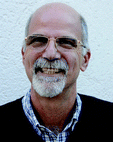DOI: 10.1039/C2CC90402K
(Profile)
Chem. Commun., 2012, 48, 12141-12141
Interview with Maurizio Prato
| ||||||
Do you remember what it felt like to publish your first ChemComm article?
My first ChemComm article dates back to 1984. When the manuscript was accepted for publication, I felt thrilled with excitement: ChemComm was a top Journal, I was young and inexperienced and publishing there was a rather tough challenge. After so many years and more than 400 papers published, I still love receiving positive answers from ChemComm Editors.How has your research evolved from your first to your most recent article?
Since 1984, I have come across many fields of organic chemistry. I started in physical organic chemistry, moved to organic synthesis and ended up into organic chemistry applied to nanosciences. Over the years, I have followed my instinct to find the field most suited to my taste, knowledge and skills.What do you like most about publishing in ChemComm?
Publishing in ChemComm means:(1) A fair peer review process. It has never happened to me (so far…) that a decision is taken based on the taste of the handling Editor, as happens, on the contrary, in some other journals.
(2) Speed of publication. After the manuscript is accepted, it only takes hours to see the proofs: I am really impressed by this level of efficiency.
(3) Excellent graphics at no cost for color figures.
(4) High visibility.
What aspect of your research are you most excited about at the moment?
Our ambition is to master new protocols for the tailored design of nanomaterials with specific functions. We believe this is one of the new frontiers of organic synthesis. Hybrid nanostructures mimicking the photosynthetic tissue of green leaves, liberating oxygen and solar fuels. Carbon nanotubes as substrates in Neurosciences, to improve neuronal connections and, hopefully, to help regenerate nerve tissues.These are the two projects that lie close to my heart now, as I strongly believe that, as chemists, we have that special gift to shape matter for better living.
What is the best part of your job?
I believe it is a privilege to be a scientist and I really feel a lucky person. I love my job, I do not think it is a duty, but, rather, a way of living, with curiosity, enthusiasm and a never ending positive attitude, full of hope and expectations. We enjoy freedom, challenges, top science, human contacts, life and feelings.What is the secret to success in scientific publishing?
A successful scientific career often depends on a strong publication record. The secret to success in scientific publishing is to perform sound and timely research, oriented to the understanding of the more interesting scientific problems, and to rigorous, original and reproducible experimental protocols.What is your advice to young emerging scientists?
Young emerging scientists do not really need advice, they are smart and strong enough, they know what they want and they know how to achieve it. If I had to say something, I would suggest avoiding excessive fragmentation of research: find an important problem and try to effectively solve it, if possible, by installing fruitful collaborations with emerging scientists of other disciplines. But, especially, they should enjoy what they are doing.What do you do in your spare time?
I love swimming in the sea, and the silence and peace while fishing on a boat at sunrise. Otherwise, I enjoy cinema, theatre, music (opera especially) and reading.By the time I'm 100 I would like to...
...live in a sea-front house, taking a swim now and then, and relaxing, having eventually achieved my secret dreams.| This journal is © The Royal Society of Chemistry 2012 |

